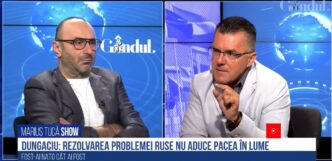
“I saw a country at war and I really wanted to do something” – Thus began the journey that took Alex Craiu, a Romanian volunteer in Ukraine, from a makeshift kitchen in a basement in Kharkov to the heart of missile-lit Kiev and a stone’s throw away from the Russian border. The volunteer told G4Media, as part of the ENTR project, how he travelled across much of Ukraine in a wheelchair to show people “places they didn’t want to visit but wanted to see”.
This reasoning was behind the name of the TikTok channel “Nuvreiaici” (You don’t want to be here), which the young man from Turda, Cluj county, used to document and expose his journey to an audience of over 30,000 people.
The 26-year-old Alex is a videographer by trade. He is a film graduate from the University of Leeds, UK, and has chosen to use his skills to show the world the realities of war that he has come to see with his own eyes “out of curiosity”.
Although short-lived, a visit to the war-torn country left a deep impression on Alex, and in the autumn of 2023 he decided to settle in Ukraine for the long term, determined to do what he could to help, within the confines of the wheelchair he needs to get around.
He has been unable, for example, to help with efforts to rebuild damaged buildings, and the almost total lack of disability-accessible infrastructure has made getting around towns sometimes even more difficult than at the front, where he can drive. On top of that, he also felt a certain mistrust from people, stemming from a simple question: “How can this man travel in war zones when… he doesn’t have ramps in the city”.
Fortunately, the desire to help and manual skills proved more important than ramps. Like many other international volunteers, Alex has been involved in making camouflage nets, vital for Ukrainian soldiers, but he also worked briefly in a bakery in Kharkiv, baking bread for the military and vulnerable civilians.
He never gave up on his original calling: creating video content, which began to give him considerable traction on social media.
“After noticing that the videos I was putting on the internet were unexpectedly popular, I decided to focus on this because it’s important for people to see that even though this war has been going on for two years now, it’s by no means over.”

Since then, Alex Craiu has travelled to 17 of Ukraine’s 24 regions and has seen “most of the big cities”, numerous villages and at one point he was only a few minutes drive from the border with the Russian Federation.
He describes the journey to Dementiivka, north of the city of Kharkov, as one of the most dangerous moments he has experienced in Ukraine. Once past military checkpoints, surrounded by bullet riddled road signs, craters left behind by rockets and drones, he says he finally realised that every minute more brings with it a “very high risk of losing everything”.
From the 13th floor you could see everything
Ironically, however, the worst moments were in Kiev during the winter, when air strikes were the order of the day.
“I saw drones crashing less than 2km from my window. From the 13th floor you could see everything. The sky was lit up with missiles exploding in the air, drones being shot down, missiles being launched to shoot down enemy ones. You couldn’t sleep at night, there were so many alarms”, is the experience described by the Romanian volunteer.
Over time, however, he has become accustomed to life “lived between extremes,” to a world where people walk their dogs while rockets fly over the city. In fact, he says, seeing this world with his own eyes is the main reason he could not stay in Romania for long after his initial visit to Ukraine.
Europe – between mystery and an oasis of hope

Everywhere he has travelled, Alex Craiu says he has met stoic people who “have become very strong” after two years of war and who, although in many cases they don’t know much about the rest of the world abroad, still look to Europe with hope.
“The European Union is seen as a mystery, but it’s… it’s also the oasis of hope for Ukrainians, it’s that place where they would go if they could give up their homeland. Ukrainians find it difficult to do that, even if they left in large numbers, they left out of fear and they came back because they couldn’t be happy anywhere else (…) This country is calling them, but it’s… Yes, from a strategic point of view, from a war point of view, the European Union is important for Ukrainians.”
According to the volunteer, the European Union must continue to support Ukraine, not only because it is “at an absolute disadvantage” to Russia, but also because helping a democratic state in the face of such aggression is a matter of principle:
“Just as Russia is helped by its allies… It is important that Ukraine also has its allies, and its allies, by virtue of democracy and the common values we share… Ukraine’s allies are the European countries”.
Although the United States remains by far Ukraine’s most important ally in terms of military support, most of the direct financial support Kiev has received over the past two years has come from European institutions: almost €80 billion between January 2022 and January 2024, according to Statista.
The military support received from EU states also cannot be ignored – according to a CNN analysis, 43% of the direct military aid received by Ukraine by the beginning of 2024 comes from EU states, of which the main donors are Germany, Denmark, the Netherlands and Poland.
Together, EU states have given Kiev more than $50 billion worth of military aid, and these figures only include individual state contributions, not military support provided through European institutions, CNN points out.
On top of that, the overwhelming majority of Ukrainians who have left the country have chosen to settle in EU states: of the more than 6.4 million Ukrainian migrants still registered globally, nearly 6 million have remained within the borders of the European Union, according to the latest UN assessment.
From the young man’s observations, delaying or even stopping Western support would have far more serious negative effects on Ukrainian morale than the actual attacks, which have already become the norm. In any case, the Romanian is optimistic about this:
“I’ve been pretty much everywhere in Ukraine. I’ve been in most of the big cities, obviously the ones that are not under occupation (…) I haven’t seen people who are demoralised. People go on with their lives, people go to restaurants, people party, even if there are bombs. Why? Because, after all, it’s their life, which they can’t put on hold for 2-3 years”.
Under the same sky

According to Alex Craiu, the daily life of each Ukrainian volunteer varies drastically and depends on many factors, from geographical location, individual physical training and the level of danger each is willing to face.
Alex, for example, was unable to collaborate “for obvious reasons” with Brave to be Build, an initiative of international volunteers rebuilding homes destroyed or damaged by Russian attacks, which requires considerable physical effort.
On the other hand, there is no shortage of challenges in the “lighter” activities. Alex tells how, in Kharkov, volunteers cooking and distributing food had to work in a space set up in the basement of a shopping mall, because “to maintain a kitchen for the long term in Kharkov you have to be in a basement, otherwise they bomb you”.
Working hours also vary: as it is voluntary work, “it’s all up to one’s availability”, but often difficult circumstances leave no room for rest, explains the young man. In Kharkov, for example, some volunteers worked shifts of more than 12 hours a day to meet the food needs not only of soldiers but also of civilians sheltering in the city. In short, food “had to be distributed everywhere”.
It was precisely these conditions that gave rise to a bond between volunteers and locals that, he explains, he has never felt anywhere else.
It was precisely these conditions that gave rise to a bond between volunteers and locals that, he explains, he has never felt anywhere else.
“My life identified from the beginning probably almost 100% with the Ukrainians. Why? Because we were all under the same sky, the same sky that had rockets, drones or whatever else the Russians were throwing at us. We were all under the same sky, even if we didn’t speak the same language. We were linked by the fact that we were in the same situation after all.”
Although he still calls himself a “13th floor observer”, Alex Craiu has spent the last six months in Ukraine, hasn’t been on “holiday” in Romania for over six months, and says he is willing to stay in Ukraine for as long as it takes, whether months or years, “because there is so much to do here and basically my life is here”.

Ne bucurăm că ne citești!
Dacă vrei să ne și susții:











